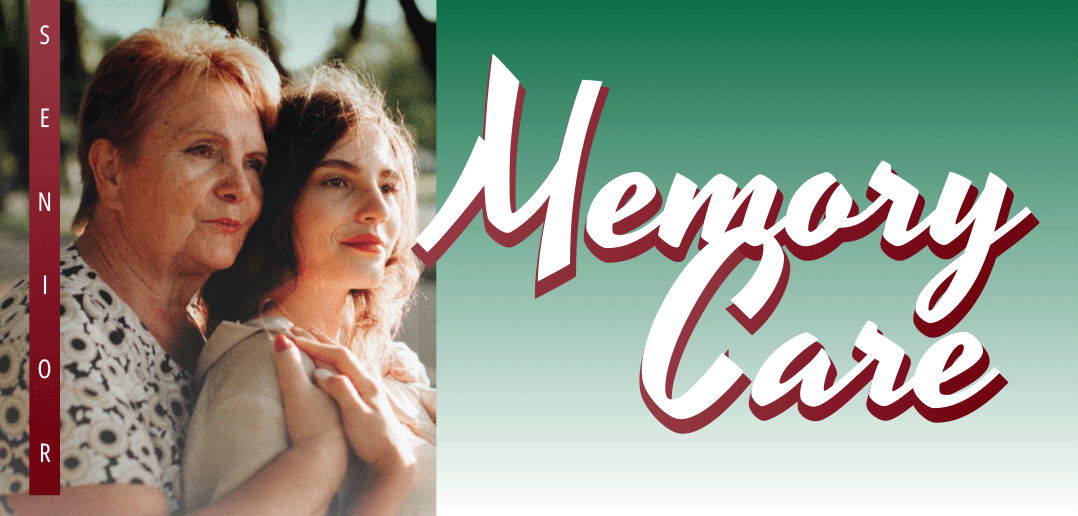Memory care for seniors is a highly specialized and compassionate approach to senior living that addresses the unique challenges faced by individuals grappling with cognitive impairments, such as Alzheimer’s disease or various forms of dementia. These facilities are specifically designed to provide a supportive, secure and structured environment that caters to the distinct needs of each resident.
One key aspect of memory care is the presence of trained and empathetic staff who can offer individualized care plans. These plans typically encompass assistance with daily activities like bathing, dressing and meal preparation, as well as medication management to ensure residents receive the proper treatment for their conditions.
Memory care facilities also often place a strong emphasis on cognitive stimulation and engagement. Activities tailored to residents’ abilities and interests, such as reminiscence therapy, art therapy and music therapy, are integrated into daily routines to help maintain cognitive function, foster social connections and reduce anxiety and agitation.
The overarching goal of memory care is to improve the quality of life for seniors facing memory-related challenges while providing peace of mind to their families. It aims to promote a sense of dignity and comfort, helping residents maintain their independence for as long as possible while living in a supportive and nurturing environment that prioritizes their well-being. Families often find solace in knowing their loved ones are receiving specialized care that not only meets their physical needs, but also recognizes their individuality and the importance of preserving their memories and identity. When it comes to memory care, the local professionals of Lincoln truly are some of the best.
Personalized Care at Home
In-home care is a common alternative to senior living for those who can no longer live independently. It is a compassionate and tailored healthcare service that allows seniors dealing with dementia to receive essential assistance and support in the comfort of their own homes. This type of care not only promotes independence and a sense of familiarity, but also ensures that individuals can maintain their quality of life and dignity while receiving personalized, one-on-one attention that meets their specific needs and preferences.
Caring Friends In Home Care (caringfriends.com) takes an approach that not only aims to improve the quality of life for those with memory impairments, but also offers invaluable support to families, providing them with peace of mind as their loved ones receive specialized, compassionate care.
“Many seniors have lived in the same house for decades, and moving to a new, often smaller home is a difficult and emotional process,” shared Director of Health Services Deb Maguire, LPN. “Here at Caring Friends In Home Care, we provide light housekeeping, weekly meal prep, assistance with dressing, bathing, grooming and laundry, and we adjust our care to fit the new needs as a senior ages. If the senior progresses to where being at home is no longer safe, Caring Friends can follow the senior to a community to help make the transition easier and more familiar.”
With the right care tailored to their needs, seniors with cognitive decline can age with dignity, enjoyment and independence. Whether they get to remain in their home for a few months or the rest of their lives, each moment matters, and each connection they make will continue with them.
Scheduled Medication
Scheduled medication management plays a critical role in the care of individuals with memory loss. Failure to adhere to prescribed medication regimens can lead to worsening symptoms, increased health complications and decreased quality of life, but remembering to take medications can become increasingly difficult with age.
Caregivers, healthcare professionals and automated systems can help ensure that medications are administered on time, in the right dosage and as prescribed. This not only supports the individual’s physical well-being, but also helps manage their cognitive symptoms more effectively, contributing to a better overall quality of life and potentially slowing the progression of the memory loss condition.
“From a pharmacy perspective, people struggling to remember to take their meds can be very detrimental to managing their health care, which can then further lead to not being allowed to remain in their home,” shared Shannon Schultz, Owner of Nebraska LTC Pharmacy (neltcpharmacy.com). “Some people don’t have anyone there to ensure medication is taken routinely and properly – that’s where I can come in and help!”
Nebraska LTC Pharmacy provides free weekly blister packaging and delivery – something they have found to be much more manageable for someone who may be forgetting or feeling overwhelmed with multiple prescription bottles sitting around. They don’t have to worry about which ones they need to take at which times of day, as that is all in the blister packs. This also removes the possibility of double-dosing or taking meds they aren’t supposed to be taken anymore.
Nail Down Next Steps Early
Planning funeral arrangements in advance is a crucial step for individuals diagnosed with dementia. It’s important to have these discussions and make arrangements while the individual is still able to participate and make decisions. This proactive approach allows the person with dementia to express their wishes regarding their funeral and burial, ensuring that their preferences are respected, relieving their loved ones of the emotional burden of making these decisions during a difficult time. Pre-planning provides peace of mind to both the individual and their family, and it can be a loving and considerate way to honor the person’s wishes when the time comes.
When approaching the difficult conversation, Wyuka Funeral Home & Cemetery (wyuka.com) recommends being open-minded. It’s important to have empathy as you navigate the conversation. Try to understand their sensitivity and perspective, and provide support and reassurance frequently. The goal is to get a plan decided upon, and doesn’t have to come at the expense of the comfort of those involved.
There’s no need to ‘schedule’ a conversation to avoid upsetting those involved. It’s okay to be subtle and create an ongoing conversation on the topic of prearrangements.
A Safe, Nurturing Environment
Seniors facing the challenges of Alzheimer’s disease and other related dementias need a safe, nurturing environment. Such an environment should offer specialized care, support and activities tailored to their unique needs, as well as a focus on safety to prevent wandering and confusion. Creating a comforting and understanding atmosphere is vital for seniors with dementia to enhance their overall quality of life and provide peace of mind for their families.
“At Sumner Place, we educate our team members on effective communication skills so that residents can be successful in their daily lives,” said Sumner Place (sumnerplacecare.com) Admissions and Public Relations Coordinator Megan Herter. “Dementia can be a long and unforgiving journey for all who are involved, as it not only affects memory loss, but also the ability to communicate and understand what is going on in the world. Having great communication is necessary to create a safe, nurturing environment for those suffering from memory loss.”
Unique programs like Music & Memory and Buddies Forever are the kinds of things that give Sumner Place Skilled Nursing & Rehabilitation their reputation of being a high quality option for memory care and skilled nursing. Sumner Place focuses on the strengths of each resident by using their historical and personal interests as a method of minimizing the difficulties associated with dementia related symptoms. Sumner Place’s focus on individualized programs for residents with dementia is commendable. These specialized programs, designed to reduce confusion, fear and agitation, are crucial for enhancing the well-being of individuals with memory-related conditions.
Redirect, Reassure and Validate
When dealing with memory loss, particularly in individuals with conditions like Alzheimer’s disease or dementia, the “redirect, reassure and validate” method is an invaluable approach. It involves redirecting the individual’s attention away from distressing or confusing thoughts, reassuring them with empathy and understanding and validating their feelings and experiences, even if they may not align with reality. This method helps reduce anxiety and frustration, fosters a sense of security and trust and maintains their dignity and well-being. It’s a compassionate and effective way to navigate the challenges of memory loss, allowing individuals to feel heard and supported in their journey.
At Legacy Retirement Communities (legacyretirement.com), they utilize the effective “redirect, reassure and validate” method to offer comfort and encouragement while navigating challenges that come with memory loss.
“Legacy Arbors offers 8 a.m. – 8 p.m. daily programming and activities, ranging from music and games to outings, allowing residents to be as busy and active as they want to be. Our residents always have a choice in everything they are offered throughout each day. Dementia education is at the core of our training for all staff members at Legacy Arbors. Each member of our team utilizes the same practices to provide a continuity of care, regardless of the role or who is helping the individual,” shared Activities Director Michele Carlson. “Legacy Arbors embraces the Best Friend’s model of care. The ‘Best Friends’ philosophy is treating residents as friends and focusing on their individual preferences and choices.”
The Best Friends Approach is a widely recognized and respected model of care for individuals with memory loss, particularly in the context of Alzheimer’s disease and dementia. This approach places a strong emphasis on compassion, empathy and respect when caring for individuals facing cognitive impairment and age-related challenges. The Best Friends Approach is highly regarded for its holistic and person-centered approach to memory care, and it aligns with the goal of enhancing quality of life.
Forget About Being Overwhelmed
Caring for seniors with memory issues can be an overwhelming and emotionally taxing responsibility. It often involves managing complex medical needs, unpredictable behaviors and the gradual loss of cherished memories. It’s completely normal to feel overwhelmed. Seeking support from memory care professionals, support groups or respite care services can provide valuable assistance and relief.
If you are wondering how to support seniors facing memory challenges and seeking answers for caring for aging parents and other issues facing seniors, all while managing the complexities of selling the family home, discover Alicia Chrastil’s approach with her Nebraska Savvy Seniors (nesavvyseniors.com) Empowerment Seminars and Real Estate Strategies for Senior Transitions.
At Nebraska Savvy Seniors Empowerment Seminars, they provide monthly informational seminars about current hot topics facing seniors and their families navigating the memory care journey and other issues. They offer expert insights from healthcare professionals and specialists to answer questions and provide resources.
“What sets us apart is our holistic approach. Not only do we offer valuable advice and resources for seniors including memory care, but we also specialize in real estate services designed to make the process of selling the family home as smooth as possible. Our team becomes your hub, connecting you with all the service providers you may need during this transition,” said Alicia. “Join us to learn how we transform the daunting experience of caring for seniors and home selling into a seamless, stress-free journey. Discover the ‘From Overwhelmed to Overjoyed’ difference with Alicia Chrastil Realtor with Nebraska Realty.”
Importance of Recognizing Behavioral Changes
Changes in a loved one’s behavior and well-being can be so gradual that family members may not immediately notice. Often, those with memory loss forget to perform essential tasks like taking medications, maintaining personal hygiene or eating properly. It’s essential to be vigilant and observant of their surroundings, as missing little things can lead to bigger problems down the road. Even a slight change in behavior could be a sign there is a need for additional support and intervention. Regular checks and open communication with healthcare professionals can help ensure the best care and quality of life for your loved one in such situations. At Visiting Angels, they give their clients’ families access to important caregiver notes. They are able to see any changes and track the progression of their loved one.
If you are looking for in-home care options, Visiting Angels (visitingangels.com) offers specialized dementia and Alzheimer’s care. They strive to help you or your loved one maintain independence while remaining at home. This approach can greatly benefit those with memory-related conditions by providing tailored care that addresses unique needs and challenges. It allows for a familiar and comfortable environment while still ensuring safety and assistance with daily tasks.
“Visiting Angels focuses on meeting the client where they are,” explained Client Care Coordinator Julie Day. “We educate our caregivers on their client’s needs and develop an individual plan for each client. Quality of life for some clients may be a very busy day with activities and goals for the day. For other clients it may be important to be a friend and companion while providing assistance with basic needs and reminiscing with them. Visiting Angels makes good communication a priority while we accompany each of our clients on their journey.”
Remaining at Home
Advancements in technology and home-based care services have become even more crucial for seniors dealing with memory-related conditions like dementia or Alzheimer’s disease. These innovations offer tools for safety monitoring, medication management, cognitive stimulation and telemedicine, ensuring seniors can age at home with enhanced safety and access to medical care. Dementia-friendly home adaptations in addition to specialized home-based memory care services, such as those provided by caregivers like Worry Free Home Care, further enrich the quality of life for seniors and their families, ultimately promoting independence and well-being within the familiar environment of home.
Seniors with memory issues require specialized care that considers their unique needs. Memory care services from Worry Free Home Care (worryfreehomecare.org) encompass activities, routines and therapies specifically designed to support cognitive function and emotional well-being.
“Our caregivers aren’t your typical professionals. They are dedicated individuals who strive to build relationships and creative positive change. We care about our seniors and provide exceptional home care services that show it,” said Founder Racheal Odoy.
Worry Free Home Care places a strong emphasis on the critical need for communication and collaboration among healthcare providers, family members and other caregivers. Effective communication ensures that all aspects of a senior’s memory care, which can be complex and multifaceted, are addressed comprehensively and that everyone involved is well-informed about the individual’s condition, progress and evolving needs. This approach not only enhances the quality of care for seniors with memory-related conditions, but also provides valuable support and peace of mind to their families and caregivers, promoting a more holistic and compassionate caregiving experience.
Thriving at Home
Non-medical assistance provided in the comfort of clients’ homes encompasses a range of supportive services aimed at helping individuals with their daily activities and overall well-being without involving medical procedures or treatment. This type of care includes tasks such as companionship, assistance with activities of daily living, meal preparation, medication reminders, light housekeeping, transportation, mobility support, respite care, safety supervision and the creation of personalized care plans. Non-medical home care is particularly valuable for individuals who require help to maintain their independence and enhance their quality of life while remaining in their familiar home environment.
AmanaCare’s (amana-care.com) approach to caregiving is truly exceptional. While they do offer non-medical assistance to clients in the comfort of their homes, their commitment goes beyond typical caregiving services. AmanaCare places a strong emphasis on nurturing and building meaningful relationships between their clients and caregivers. This focus on the human connection adds a special dimension to the care they provide, enhancing not only the practical support, but also the emotional well-being of their clients. Building such relationships makes a significant difference in the quality of care and the overall satisfaction of those receiving it.
Their commitment to comprehensive care covers all aspects of well-being, ensuring that clients not only remain at home, but also experience happiness and safety. By tailoring their services to the unique needs and preferences of each individual, AmanaCare strives to provide a high quality of life, making it possible for clients to age in place, where they want to be. AmanaCare’s client-centered approach emphasizes not just staying at home, but thriving at home.
Maintaining Freedom
The gradual loss of the ability to perform essential daily activities can be deeply distressing for both the individual and their loved ones. As seniors lose their independence, it can be emotionally difficult for them and their families – they are losing memories and skills that have always come naturally to them, which can be extremely confusing and disheartening when they feel they can’t be independent anymore. Memory loss can lead to significant changes in behavior, such as emotional outbursts, inappropriate actions and wandering, which further emphasize the importance of specialized care and support to maintain the well-being and dignity of these individuals.
The goals at The Waterford Communities (thewaterford.net) are to maintain the independence, safety and dignity of their elders. The experienced team provides empathetic, individualized care as well as activities tailored to the cognitive needs of those with memory loss.
“Here at the Waterford at College View, we can provide a new place to call home where we will accommodate YOUR needs, also including memory care needs,” shared Administrative Director Melissa Vandeloo. “Being customer centric is something we take very seriously because we know the importance of feeling safe and being safe in your home is the first step to living out the best years of your life here at the Waterford at College View. When living at College View, you get to experience the heartwarming environment that is always welcoming. The days are filled with meaningful activities that are tailored to the appropriate skill set.”
A Comprehensive Approach
Memory Care assisted living communities play a crucial role in supporting those with Alzheimer’s and related conditions, as well as offering peace of mind for their families. Creating a warm and friendly atmosphere is vital for individuals with memory issues, as it can significantly improve their quality of life. Memory care communities like High Plains Alzheimer’s Special Care Center are designed to provide specialized care and support for individuals with memory loss, including Alzheimer’s disease and other forms of dementia.
High Plains (frontiermgmt.com) emphasizes the importance of creating a warm and friendly atmosphere, which can have a profound impact on the well-being of residents. By fostering a sense of community and belonging, in addition to a focus on cultivating purpose in the lives of each person, they help residents feel more comfortable and less isolated, reducing feelings of anxiety and depression often associated with memory loss. The community also regularly communicates with families, keeping them informed about their loved one’s progress and any changes in their condition. Their care is family-driven, meaning that families are empowered to make choices they feel are best for their loved ones living with Alzheimer’s or dementia.
High Plains’ comprehensive approach to care helps them excel in managing challenging behaviors commonly associated with Alzheimer’s. With specially trained staff and a secure environment, they create a safe and structured space for residents. Individualized care plans cater to each person’s specific needs and preferences, encompassing assistance with daily activities, medication management and engaging cognitive and physical activities.
Memory loss is a challenging issue for seniors and their loved ones, but there are several amazing local businesses that can provide valuable assistance and support. Consider contacting home care agencies for experienced caregivers or memory care facilities designed to cater to the unique needs of seniors with memory loss, ensuring that your loved one receives the care and support they require while allowing you to make the most of your time together.









